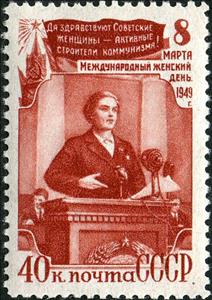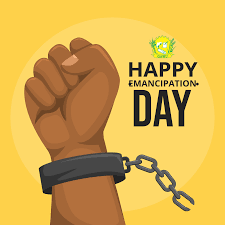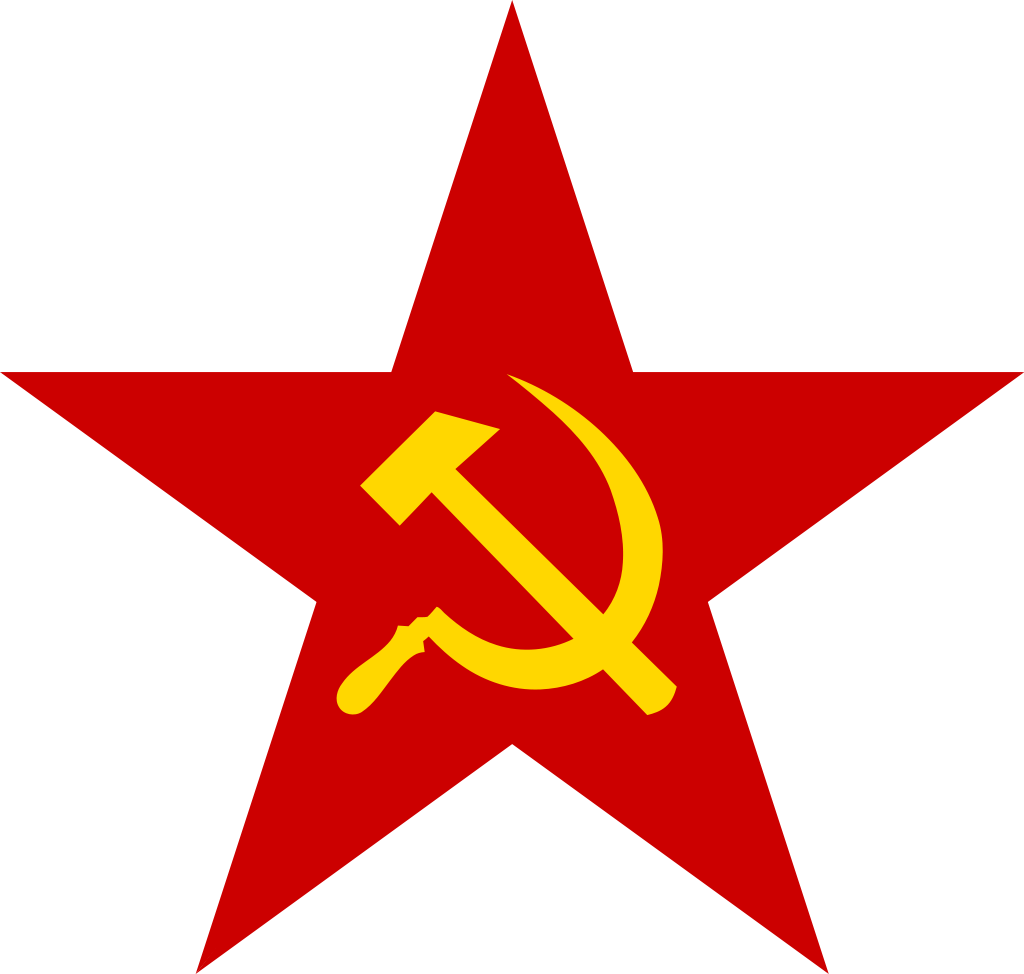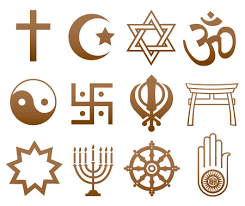Stamp: Soviet woman in the management of state affairs (Soviet Union, USSR 1949)
Soviet woman in the management of state affairs (Soviet Union, USSR 1949)
01 January (Soviet Union, USSR ) within release 10th Anniversary of Reunion of W.Ukraine and W.Belarus goes into circulation Stamp Soviet woman in the management of state affairs face value 40 Russian kopek
| Stamp Soviet woman in the management of state affairs in catalogues | |
|---|---|
| Michel: | Mi:SU 1320 |
Stamp is vertical format.
Also in the issue 10th Anniversary of Reunion of W.Ukraine and W.Belarus:
- Stamp - Coat of Arms of Byelorussian SSR face value 40;
- Stamp - Lenin's Mausoleum face value 40;
- Stamp - Vasily Williams (1863-1939), Russian and Soviet agronomist face value 25;
- Stamp - Soviet woman in Textile industry face value 20;
- Stamp - Soviet woman in Pre-school Education face value 25;
- Stamp - Soviet woman in the management of state affairs face value 40;
- Stamp - Women in Socialistic Agriculture face value 50;
- Stamp - Soviet schoolmistress face value 50;
- Stamp - Soviet woman in mass sport face value 1;
- Stamp - Stepan O. Makarov (1849-1904), Russian naval commander face value 40;
- Stamp - The Building Of Military medic academy face value 40;
- Stamp - S. Botkin, N. Pirogov, I. Sechenov & Military medic academy face value 50;
- Stamp - Miner with coal hammer face value 15;
- Stamp - Scientist at microscope face value 30;
- Stamp - Coat of Arms of the USSR face value 40;
- Stamp - Working people with May Day banner face value 40;
- Stamp - Soviet newspapers and works by Marx, Lenin, Stalin face value 40;
- Stamp - Alexander Popov, inventor of radio face value 40;
- Stamp - A.Popov shows the world's first radioset to admiral Makarov face value 50;
- Stamp - Alexander S. Pushkin (1799-1837), Russian author face value 25;
- Stamp - A.S. Pushkin among his friends in Kamenka face value 40;
- Stamp - Boldino State Literary Memorial and Museum of A. Pushkin face value 1;
- Stamp - Ivan Michurin (1855-1935), Russian botanist and selectionist face value 40;
- Stamp - Tugboat face value 40;
- Stamp - Vasily V. Dokuchayev (1846-1903), Russian geologist face value 40;
- Stamp - Vasily I. Bazhenov (1737/38-1799), Russian architect face value 40;
- Stamp - Alexander N. Radishchev (1749-1802), Russian author face value 40;
- Stamp - Khosta: Sanatorium of the Ministry of Communications face value 40;
- Stamp - Khosta: Sanatorium #3 of Trade unions of USSR face value 40;
- Stamp - Khosta: Sanatorium of power engineering specialists face value 40;
- Stamp - Zheleznovodsk: Sanatorium #41 of Trade unions of USSR face value 40;
- Stamp - Sochi: State Theatre face value 40;
- Stamp - Sochi: Frunze Sanatorium face value 40;
- Stamp - Makhinjauri: Sanatorium "Zelyony mys" of Trade Unions face value 40;
- Stamp - Kislovodsk: Sanatorium #1 of Trade unions of USSR face value 40;
- Stamp - Kislovodsk: Sanatorium #3 of Trade unions of USSR face value 40;
- Stamp - Ivan P. Pavlov (1849-1936), Russian physiologist face value 40;
- Stamp - The Globe belted with envelopes face value 40;
- Stamp - The Globe belted with envelopes face value 40;
- Stamp - Field-protective forestation face value 25;
- Stamp - Forest shelterbelts to collective farm fields face value 40;
- Stamp - Map of forest shelterbelts and field-protective forest face value 40;
- Stamp - Build ponds and reservoirs! face value 50;
- Stamp - Field-protective forestation face value 1;
- Stamp - Vasily I. Chapayev (1887-1919), Hero of Civil War face value 40;
- Stamp - Ivan S. Nikitin (1824-1861), Russian poet face value 40;
- Stamp - The building of Maly Theatre and Order of Lenin face value 40;
- Stamp - Maly Theater face value 50;
- Stamp - People's parade on Red square face value 40;
- Stamp - Cattle (Bos primigenius taurus), Sheep (Ovis ammon aries), M face value 40;
- Stamp - Gymnastics. Female gymnast on rings. face value 40;
- Stamp - Weightlifting face value 1;
- Stamp - Four-axle full-metal tramcar (MTV-82) face value 25;
- Stamp - Freight steam locomotive (class "L", config. 1-5-0) face value 50;
- Stamp - Coat of Arms and State Flag of the USSR face value 40;
- Stamp - Textile industrial complex. Cotton and trucks. face value 20;
- Stamp - Irrigation System face value 25;
- Stamp - The House of the Government of Tajik SSR in Stalinabad face value 40;
- Stamp - Medical college and Teacher's training college in Stalinabad face value 50;
- Stamp - Reunion of Western Byelorussia with Byelorussian SSR face value 40;
- Stamp - Worker with flag behind globe face value 40;
Stamp Soviet woman in the management of state affairs it reflects the thematic directions:
A festival is an event celebrated by a community and centering on some characteristic aspect or aspects of that community and its religion or cultures. It is often marked as a local or national holiday, mela, or eid. A festival constitutes typical cases of glocalization, as well as the high culture-low culture interrelationship. Next to religion and folklore, a significant origin is agricultural. Food is such a vital resource that many festivals are associated with harvest time. Religious commemoration and thanksgiving for good harvests are blended in events that take place in autumn, such as Halloween in the northern hemisphere and Easter in the southern.
Politics (from Ancient Greek πολιτικά (politiká) 'affairs of the cities') is the set of activities that are associated with making decisions in groups, or other forms of power relations among individuals, such as the distribution of status or resources. The branch of social science that studies politics and government is referred to as political science
Emancipation has many meanings; in political terms, it often means to free a person from a previous restraint or legal disability that violates basic human rights, such as Universal Declaration of Human Rights. Politically it is also used as a guise to procure state power offering the appearance of helping economic and social rights, political rights or equality, often as a pretext for using specifically disenfranchised groups as political proxies in a rhetorical strategy to justify greater state authority over all individuals.
Communism (from Latin communis, 'common, universal') is a left-wing to far-left sociopolitical, philosophical, and economic ideology within the socialist movement, whose goal is the creation of a communist society, a socioeconomic order centered around common ownership of the means of production, distribution, and exchange that allocates products to everyone in the society based on need. A communist society would entail the absence of private property and social classes, and ultimately moneyand the state (or nation state).
A woman is an adult female human. Before adulthood, a woman is referred to as a girl (a female child or adolescent)
A symbol is a mark, sign, or word that indicates, signifies, or is understood as representing an idea, object, or relationship. Symbols allow people to go beyond what is known or seen by creating linkages between otherwise very different concepts and experiences. All communication (and data processing) is achieved through the use of symbols. Symbols take the form of words, sounds, gestures, ideas, or visual images and are used to convey other ideas and beliefs. For example, a red octagon is a common symbol for "STOP"; on maps, blue lines often represent rivers; and a red rose often symbolizes love and compassion. Numerals are symbols for numbers; letters of an alphabet may be symbols for certain phonemes; and personal names are symbols representing individuals.




